hankyoreh
Links to other country sites 다른 나라 사이트 링크
[News analysis] Absconding ambassador marks apex of arrogant prosecutorial rule in Korea
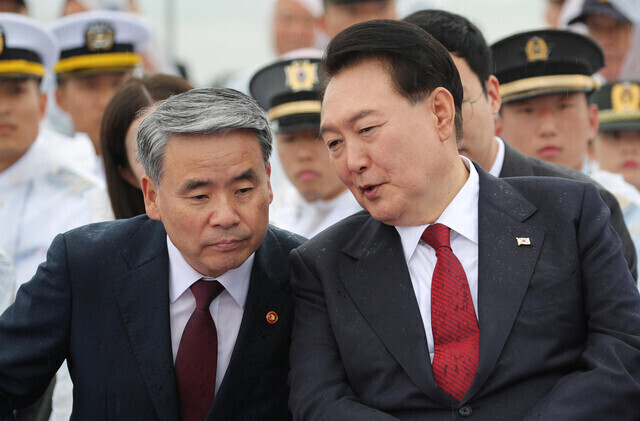
Former Defense Minister Lee Jong-sup was in a rush when he left South Korea last week and set course for Australia, where he is now serving in his new role as ambassador. It was as if someone was hot on his heels.
How has Lee, the key suspect in a case of an alleged cover-up of an investigation into the death of Marine Lance Cpl. Chae Su-geun, who drowned during rescue efforts during heavy flooding in 2023, been appointed as an ambassador and allowed to flee the country?
This decision to appoint Lee as a foreign envoy — a decision that completely undermines the rule of law by interfering with an investigation, as well as tarnishing the reputation of South Korea diplomatically — cannot be said to have been made with sound judgment.
This development reeks of arrogance and immorality, as those in power declare that they will run the country as they please — laws, principles and common sense be damned. Such stances are adopted only when those in power regard the people of a country as ignorant and dumb.
Such behavior stems from the prosecutorial regime. Let’s break down what that means.
What would’ve happened if Yoon Suk-yeol and Han Dong-hoon were still prosecutors?
Lee, who had been banned from leaving the country at the request of the Corruption Investigation Office for High-ranking Officials, also known as CIO, was relieved of the travel ban and left the country on March 10 following a summary judgment on March 7. He reportedly promised to cooperate with the investigation.
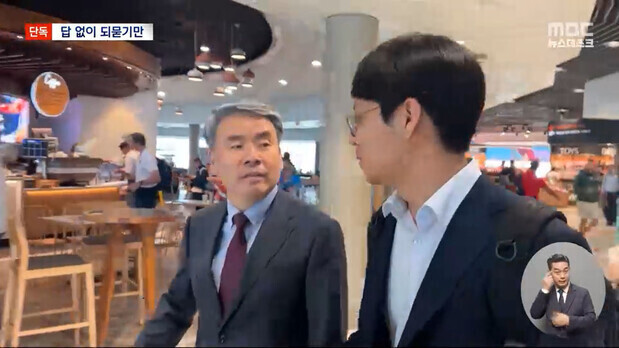
However, the cell phone he submitted to the CIO on March 7 was a new one, one that had only recently been activated after allegations of a cover-up were raised, demonstrating that he did not — and does not — intend to cooperate with the investigation.
It’s common for people under criminal investigation to destroy or throw away their phones in order to hide evidence. While it isn’t illegal to destroy incriminating evidence here in Korea, such behavior can be used to issue arrest warrants, for fears of further destruction of evidence.
However, insubstantial evidence — i.e., the cell phone Lee submitted — was all the Ministry of Justice needed to lift Lee’s travel ban.
The presidential office claims that the travel ban itself was a violation of Lee’s human rights.
“Last December, a travel ban was imposed on a former minister who clearly had no intention of fleeing the country,” said Chang Ho-jin, the chief of the National Security Office. “Extending the ban for such a prolonged period of time while investigations aren’t even being conducted is clearly a violation of basic human rights and an abuse of investigative powers.” The comments came during an appearance on a TV news program on SBS on March 14.
This is a typical case of every miller drawing water to their own mill. Democratic Party lawmaker Lee Thaney refutes that argument as follows:
“Former Democratic Party leader Song Young-gil was issued the travel ban and summoned to the country on April 24, 2023, but he was first summoned by prosecutors on Dec. 8, 2022. It took eight months for him to return to the country. This time, the CIO had been preparing for the investigation for three months, but even then, the presidential office is saying that three months is far too long. How is three months unnatural for a CIO investigation? The claim is absurd. I’m not trying to back up a certain claim. I’m just saying that these things should be carried out fairly.” (Comments made at a meeting of the National Assembly’s Legislation and Judiciary Committee on March 15).
Travel ban or not, the fact remains that Lee was the subject of an investigation by the CIO.
One cannot help but wonder how President Yoon Suk-yeol or interim leader of the People Power Party Han Dong-hoon would have reacted if, during their prosecutor days, someone they were investigating tried to leave the country in this manner.
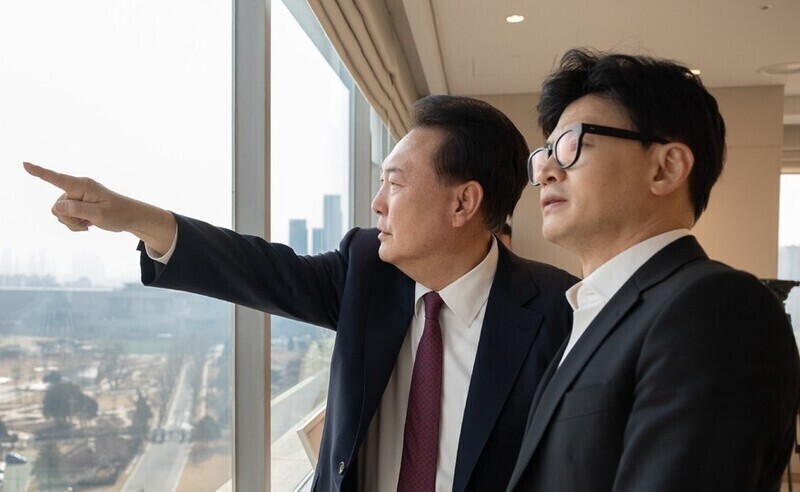
In 2016, during the influence-peddling investigation into then-President Park Geun-hye and Choi Soon-sil, the chairperson of Samsung Electronics, Lee Jae-yong, left the country while he was still under investigation.
US President-elect Donald Trump had invited him to an event featuring executives from world-class companies such as Apple, Amazon, Google and Tesla. However, even though this was before the investigation into Lee began in earnest, the special prosecutors’ team requested a travel ban from the Justice Ministry. The team was led by Yoon Suk-yeol, and prosecutors under him included Han Dong-hoon and Lee Bok-hyun, the current governor of the Financial Supervisory Service.
Han Dong-hoon has been consistently feigning ignorance about Lee’s departure from the country.
“It isn’t something for me to evaluate, and it isn’t as if his situation was deeply considered when going through the appointment. That’s how I’ve judged the situation based on common sense, and I don’t know the specifics of how he was appointed to the position,” he told reporters on March 8.
“I know we released comments about the issue, so that’s what you should base our stance on,” he said a few days later, on March 11. “I’m aware that Australia is a country that has many diplomatic issues related to national defense. The president probably took such aspects into consideration when appointing the ambassador. That’s the extent of my knowledge on that issue.”
Then on March 13, he said, “I’m under the impression that the investigation team will be able to call Lee whenever he’s needed for further investigation. I really don’t see how this can be seen as a political scandal or anything like that.”
One day prior, on March 12, the CIO revealed that the questioning that took place on March 7 only lasted for four hours, meaning the investigation team “was not able to dig as deep as it wished. The investigation team strongly believes that further investigation is essential, and it believes that the principle of subpoena should be followed.”
We’ll have to wait and see if Lee will comply with the CIO’s summons in the future. The more pressing question is why someone who may have to come back to the country for investigations and potentially face trial has been selected to serve as the new ambassador.
The haphazard appointment of an ambassador, and the nosediving reputation of South Korea
Lee submitted a copy of his credentials to the Australian government on March 12, thus beginning his official activities. Credentials are documents that an ambassador to a foreign country receives from the head of state of their home country and delivers to the head of state of the host country. Lee was in such a rush to leave the country that he couldn’t even make sure he had the original documents.
Everything about the process of appointing Lee as an ambassador deviates from every rule.
Only four countries have South Korean ambassadors who used to be ministers: the US, China, Japan and Russia. With the appointment of Lee, Australia’s diplomatic status has suddenly been elevated. The previous ambassador to Australia was appointed in December 2022 by the Yoon administration, but has been replaced without completing their normal term, which usually comes in at around two to three years.
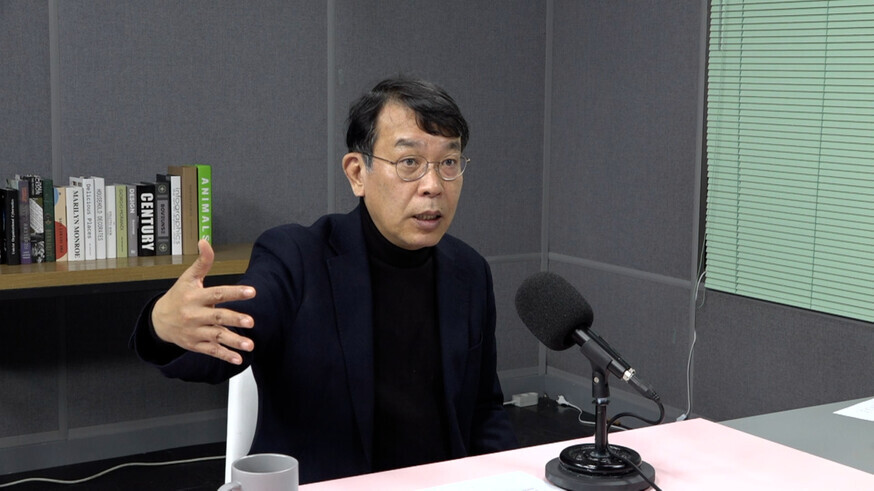
On March 13, former Justice Party lawmaker Kim Jong-dae appeared on HankyorehTV’s “Four Reporters” program.
“I’ll tell you what I think about the unprecedented appointment of a former minister as the ambassador to Australia. Those who were behind the cover-up of [Marine] Chae’s case felt guilty and rushed into looking for ambassadorial positions,” he said.
“It’d be too much to suddenly replace the ambassadors of the four major powers surrounding the Korean Peninsula, so they made themselves a seat. Typically, the former ambassador will meet with the newly appointed ambassador in South Korea to inform them about what they need to know about the transition, then the new ambassador will leave the country and take over the position,” the lawmaker went on. “In this case, everyone was in such a hurry that these steps weren’t taken, in fact, everything was done in reverse.”
At a correspondent’s dinner on March 12, Prime Minister Han Duck-soo stated, “I don’t think it’s right to postpone diplomatic matters, such as the appointment of new ambassadors, simply because we’re waiting for the results of an investigation.”
The message here is that the diplomatic duties in question were important enough to warrant sending in someone who was under investigation. But that same logic can be turned around to ask the question: Why was it necessary to assign such crucial diplomatic duties to someone bearing the stigma of being an investigation target? Is that the kind of person the other country would welcome?
On March 12, the Australian public broadcaster ABC published an article under the title “Korean ambassador Lee Jong-sup flies into Australia despite corruption probe at home.”
In it, it mentioned that the situation “has the potential to cause difficulties in the diplomatic relationship between Australia and South Korea.” Indeed, Koreans in Australia have been holding demonstrations in front of the local embassy for several days to protest the situation.
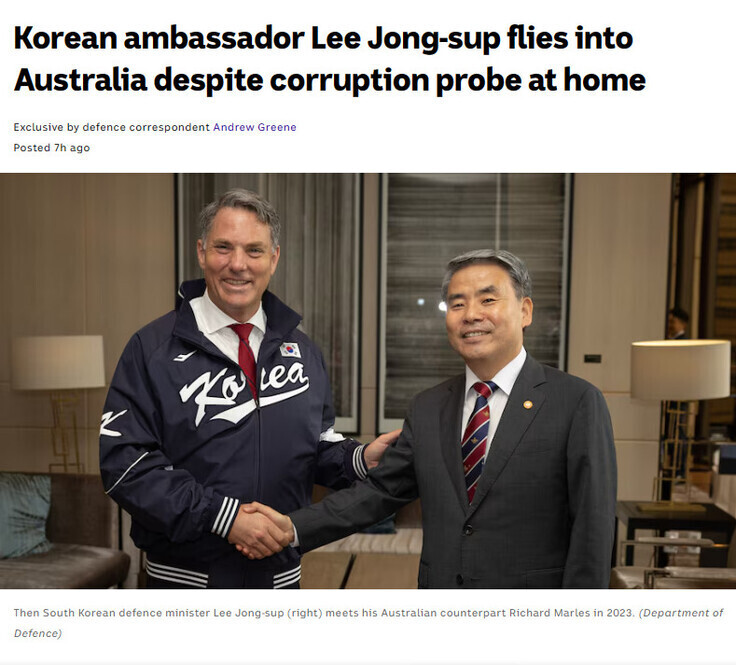
Relations with Canberra are not the only issue. Some have voiced concerns that the situation could also damage South Korea’s national prestige.
“The appointment of a major suspect as ambassador is an act that not only is disruptive to judicial order but also shows disregard for the fundamentals of diplomacy,” said Choi Jong-kun, who served as vice minister of foreign affairs during the Moon Jae-in administration, on March 11 on the MBC news program “Kim Jong-bae’s Focus.”
Choi added that it was “mortifying to consider that the position of ambassador extraordinary and plenipotentiary, appointed by the president of the Republic of Korea, could have become a judicial refuge.”
“This is not just about an ambassador — it’s a bit embarrassing that diplomats around the world who see this news will be asking themselves how the Republic of Korea came to this,” he said.
President himself implicated in allegations
It is not too difficult to imagine why the administration has taken these ill-considered actions. As the CIO investigation has progressed, it has turned up evidence not only of Lee Jong-sup’s interference with the investigation but also of involvement by the presidential office.
An MBC reporter cited an official as saying that an incident record provided to police by Marine Corps investigators had been recovered by the Ministry of National Defense, which asked the investigation headquarters for a reexamination. When the headquarters balked, Lee personally ordered the reexamination, the source said.
According to reports, the CIO confirmed from a telephone record analysis that Lee was contacted by the presidential office shortly before giving the order for the Marine Corps investigators to cancel the announcement of their findings. The landline number of the party Lee spoke with was listed under the “presidential office.”
This has only fueled speculation that Lee was hustled overseas as the investigation net began to tighten.
“I don’t think there’s any other conclusion that can be reached,” said Jang Seong-cheol, the director of the Understanding and Debate Center in a March 9 appearance on the MBC program “Political Insider.”
“The only conjecture and analysis we can make is that they did this to protect the president. I think this has the potential to become a bigger issue when [Yoon’s] term is over,” he added.
Indeed, it appears to have been a self-defeating move. Originally, the question in the investigation was whether the presidential officer or Lee had interfered illegally in the investigation into Chae’s death. Now a new variable has been added with the speculation that Lee’s appointment amounts to absconding overseas.
Now President Yoon Suk-yeol — the figure with the power to appoint ambassadors — finds himself stuck as a potentially implicated party himself. It’s an escalation of their own making.
The Rebuilding Korea Party, Justice Party, and others have lodged complaints with the CIO accusing Yoon, Justice Minister Park Sung-jae, and Minister of Foreign Affairs Cho Tae-yul of charges including abuse of authority and aiding a criminal’s escape.
The CIO has responded by launching a formal investigation assigning the matter to its fourth investigation division, which is also in charge of probing the allegations of external pressure in the investigation of Chae’s death.
The Democratic Party has proposed legislation for a special prosecutor to “investigate illegal acts in the overseas flight of former Minister of National Defense Lee Jong-sup.” The matter has become a key issue in the upcoming general elections, and it appears poised to be a major sticking point in the 22nd National Assembly once it has been decided.
In a Supreme Council meeting on March 11, Democratic Party leader Lee Jae-myung said, “We have witnessed Lee Jong-sup being allowed to flee through the back door with his appointment as ambassador to Australia. Will the public forgive this?”
But the opposition is not the only one critical of the current situation.
In a March 14 appearance on “Kim Jong-bae’s Focus,” PPP lawmaker Lee Sang-min said, “It’s not like there were some urgent circumstances that required having this person as ambassador to Australia. It’s enough to make you think they were just going ahead without any political considerations toward the upcoming elections.”
Arrogance of prosecutors’ administration sparks “dictatorship” warnings
It is surprising that Lee’s appointment as ambassador went ahead so publicly even when it was apparent that it would be controversial. There are many factors that need to be considered in administration, including laws, rules, practices, and common wisdom. It is difficult to shake the sense that the current administration looks at these simply as tools for justification as it wields power however it sees fit.
A number of similar situations have already been witnessed. One example that comes to mind is the promotion of Son Jun-sung — who was then facing trial for incitement of a criminal complaint — to the prime position of chief prosecutor. Son ended up being found guilty.
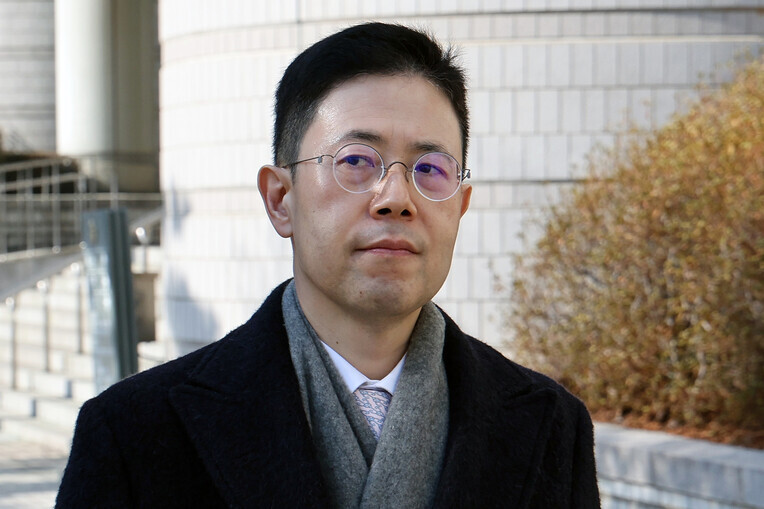
Yoon has also used his presidential authority to effectively veto legislation for a special counsel to investigate criminal charges against his wife Kim Keon-hee. In the case of external pressures on the investigation into Lance Cpl. Chae’s death, Yoon himself has been connected, and he is the one who appointed Lee as ambassador. It’s a classic example of an arrogant administration that shows no concern for what the public might think.
The roots of this situation can be found with the prosecutors as an organization. Critics argue that the investigation and indictment authority that prosecutors hold have left them effectively beyond any controls. The law also prescribes the principle of “discretionary indictment,” which means the prosecutors may decide not to press charges even when the substance of a crime has been recognized.
Now this has been expanded to the point where the prosecutors show little regard for whether that substance exists or not.
If they make up their mind to punish someone, they will throw a kitchen sink investigation at them until they find something or other to pin on their target. If they decide to go easy, they’ll use whatever legal tactics are at their disposal to justify turning a blind eye. This is what has allowed the prosecutors to so blithely shield their own.
At the moment, it appears that Yoon is carrying over these ugly tactics by prosecutors and applying them to statecraft. There’s no way to explain these bizarre administration developments — Son Jun-sung’s promotion to chief prosecutor, the veto of the Kim Keon-hee special prosecution bill, Lee Jong-sup’s appointment as ambassador — except as the arrogance of people who think, “Even if you’re guilty, just say you aren’t.”
These are people who don’t bat an eyelash at the criticisms and controls of the political opposition and press. It is not the rule of law, and it is not democracy.
In a Friday meeting of the National Assembly Legislation and Judiciary Committee, Democratic Party lawmaker Lee Tahney said, “I would like to call on the people of the Republic of Korea to pass judgment in these general elections on the abusive governing approach of President Yoon Suk-yeol, someone whose request for an arrest warrant against Col. Park Jeong-hoon on ‘insubordination’ charges shows that he has confused the perpetrators and the victims, and someone who is simply breaking down legal and procedural safeguards such as exit bans and investigations.”
A think tank recently published a report that identifies South Korea's democratic process as on a "downward slope." On March 7, the Varieties of Democracy (V-Dem) Institute at the University of Gothenburg in Sweden published “Democracy Report 2024.” The Swedish think tank analyzed the status of the rule of law, checks and balances, and civil liberties in South Korea. Scoring 0.6 on V-Dem's Liberal Democracy Index (LDI), South Korea was ranked 47th among 179 countries. As recently as 2019, the country was ranked 18th. In 2020-2021, South Korea climbed to 17th before slipping down to 28th in 2022. In 2023, South Korea slipped 19 places. South Korea was also identified as one of 42 countries that are undergoing episodes of “autocratization.”
Autocratization. A chilling word. Yet isn’t that exactly how many people feel these days?
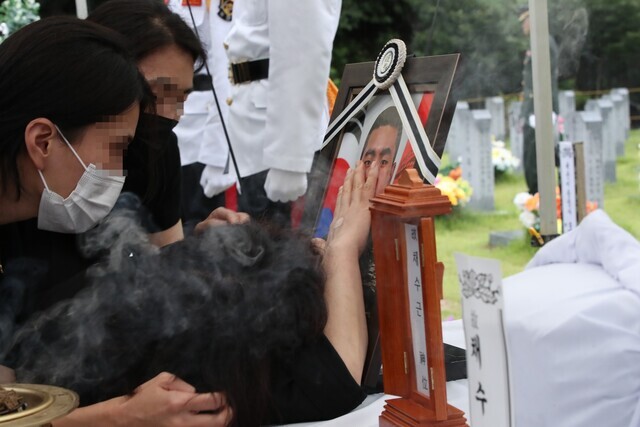
There was another marine that was caught in the same currents that took the life of Lance Cpl. Chae. This marine, however, survived. Let’s end with words written by his mother. She sent a letter to Kim Hyung-nam, the director of the Center for Military Human Rights.
“Unspeakable things are happening. If those tasked with representing the people do not do their jobs, the people have no choice but to go along with the whims of unjust power. We will see more of such incidents going forward. People in charge like Maj. Gen. Lim Seong-geun and the former minister, Lee Jong-sup, hide behind power. Please stop them. Think about the death of Su-geun and the trauma of those who witnessed his death. Please give us a country that we can proudly declare as ours before our children.”
By Park Yong-hyoun, editorial writer
Please direct questions or comments to [english@hani.co.kr]

Editorial・opinion
![[Column] Season 2 of special prosecutor probe may be coming to Korea soon [Column] Season 2 of special prosecutor probe may be coming to Korea soon](https://flexible.img.hani.co.kr/flexible/normal/500/300/imgdb/original/2024/0426/3317141030699447.jpg) [Column] Season 2 of special prosecutor probe may be coming to Korea soon
[Column] Season 2 of special prosecutor probe may be coming to Korea soon![[Column] Park Geun-hye déjà vu in Yoon Suk-yeol [Column] Park Geun-hye déjà vu in Yoon Suk-yeol](https://flexible.img.hani.co.kr/flexible/normal/500/300/imgdb/original/2024/0424/651713945113788.jpg) [Column] Park Geun-hye déjà vu in Yoon Suk-yeol
[Column] Park Geun-hye déjà vu in Yoon Suk-yeol- [Editorial] New weight of N. Korea’s nuclear threats makes dialogue all the more urgent
- [Guest essay] The real reason Korea’s new right wants to dub Rhee a founding father
- [Column] ‘Choson’: Is it time we start referring to N. Korea in its own terms?
- [Editorial] Japan’s rewriting of history with Korea has gone too far
- [Column] The president’s questionable capacity for dialogue
- [Column] Are chaebol firms just pizza pies for families to divvy up as they please?
- [Column] Has Korea, too, crossed the Rubicon on China?
- [Correspondent’s column] In Japan’s alliance with US, echoes of its past alliances with UK
Most viewed articles
- 1AI is catching up with humans at a ‘shocking’ rate
- 2Korea’s 1.3% growth in Q1 signals ‘textbook’ return to growth, says government
- 3[Column] Park Geun-hye déjà vu in Yoon Suk-yeol
- 4[Column] Season 2 of special prosecutor probe may be coming to Korea soon
- 5No good, very bad game for Korea puts it out of Olympics for first time since 1988
- 6Marriages nosedived 40% over last 10 years in Korea, a factor in low birth rate
- 7Division commander ordered troops to enter raging flood waters before Marine died, survivor says
- 81 in 5 unwed Korean women want child-free life, study shows
- 9[Column] Has Korea, too, crossed the Rubicon on China?
- 10Will NewJeans end up collateral damage in internal feud at K-pop juggernaut Hybe?